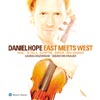Daniel Hope - East Meets West
Vibrant, exciting performances as another violinist ventures into Eastern traditions
View record and artist detailsRecord and Artist Details
Composer or Director: Ravi Shankar, Maurice Ravel, Béla Bartók, Manuel de Falla, Alfred Schnittke
Genre:
Chamber
Label: Warner Classics
Magazine Review Date: 8/2004
Media Format: CD or Download
Media Runtime: 70
Mastering:
Stereo
Catalogue Number: 2564 61329-2

Tracks:
| Composition | Artist Credit |
|---|---|
| Raga Piloo |
Ravi Shankar, Composer
Asok Chakraborty, Tabla Daniel Hope, Violin Gaurav Mazumdar, Sitar Gilda Sebastian, Tampura Ravi Shankar, Composer |
| Sonata for Violin and Piano No 0 |
Alfred Schnittke, Composer
Alfred Schnittke, Composer Daniel Hope, Violin Sebastian Knauer, Piano |
| Swara-Kakali |
Ravi Shankar, Composer
Asok Chakraborty, Tabla Daniel Hope, Violin Gaurav Mazumdar, Sitar Gilda Sebastian, Tampura Ravi Shankar, Composer |
| (6) Romanian Folkdances |
Béla Bartók, Composer
Béla Bartók, Composer Daniel Hope, Violin Sebastian Knauer, Piano Lutheal |
| Tzigane |
Maurice Ravel, Composer
Daniel Hope, Violin Maurice Ravel, Composer Sebastian Knauer, Piano Lutheal |
| Suite populaire espagnole |
Manuel de Falla, Composer
Daniel Hope, Violin Manuel de Falla, Composer Sebastian Knauer, Piano Lutheal |
Author: bwitherden
Now and then Europeans become fascinated by Eastern music. Look no further than Mozart for evidence of the fad for ‘the Turkish tinge’, the French Impressionists for Chinoiserie and Japonaiserie, and the hippies for the transitory adoption of Hindustani music. In fact, the process began when elements of Islamic music were brought back from the Crusades.
A more organic mixing of traditions has been in progress for centuries as one ethnic/cultural group intruded into the territory of another by military conquest or migration. Until at least 1492 there was rich interaction between Christian, Jewish and Islamic traditions in Spain. Perhaps the most influential of all processes was the Gypsies’ spread across Europe. In the pieces included here Ravel and Bartók draw on gypsy style, and Falla on Andalusian folk music rooted in Moorish sources. Falla’s Suite, written in 1915 for voice and piano, was later arranged for violin and luthéal, an instrument devised by modifying a grand piano to resemble a cimbalom. Ravel, too, flirted with the luthéal in Tzigane.
I can understand why no-one dusted off this curiosity for decades: with occasional exceptions, such as the last movement of Falla’s Suite, the difference between these realisations and the more familar piano versions is hardly dramatic. Sebastian Knauer’s playing – crisp, agile and expressive on both keyboards – is a good advert for the luthéal, but I suspect he could have achieved a similar effect by judicious plying of the piano pedals. Forget about the novelty and you are left with technically brilliant, highly engaging performances.
Daniel Hope gives the Bartók set an exceptionally convincing and incisive reading and the Schnittke Sonata deserves the attention of these impressive interpreters for its first recording.
The Ragas were written for Menuhin and Shankar himself. Hope and Gaurav Mazumdar transcribed them from the original LP, and revive them in vibrant, exciting performances with marvellous support from the superb Asok Chakraborty.
A more organic mixing of traditions has been in progress for centuries as one ethnic/cultural group intruded into the territory of another by military conquest or migration. Until at least 1492 there was rich interaction between Christian, Jewish and Islamic traditions in Spain. Perhaps the most influential of all processes was the Gypsies’ spread across Europe. In the pieces included here Ravel and Bartók draw on gypsy style, and Falla on Andalusian folk music rooted in Moorish sources. Falla’s Suite, written in 1915 for voice and piano, was later arranged for violin and luthéal, an instrument devised by modifying a grand piano to resemble a cimbalom. Ravel, too, flirted with the luthéal in Tzigane.
I can understand why no-one dusted off this curiosity for decades: with occasional exceptions, such as the last movement of Falla’s Suite, the difference between these realisations and the more familar piano versions is hardly dramatic. Sebastian Knauer’s playing – crisp, agile and expressive on both keyboards – is a good advert for the luthéal, but I suspect he could have achieved a similar effect by judicious plying of the piano pedals. Forget about the novelty and you are left with technically brilliant, highly engaging performances.
Daniel Hope gives the Bartók set an exceptionally convincing and incisive reading and the Schnittke Sonata deserves the attention of these impressive interpreters for its first recording.
The Ragas were written for Menuhin and Shankar himself. Hope and Gaurav Mazumdar transcribed them from the original LP, and revive them in vibrant, exciting performances with marvellous support from the superb Asok Chakraborty.
Discover the world's largest classical music catalogue with Presto Music.

Gramophone Digital Club
- Digital Edition
- Digital Archive
- Reviews Database
- Full website access
From £8.75 / month
Subscribe
Gramophone Full Club
- Print Edition
- Digital Edition
- Digital Archive
- Reviews Database
- Full website access
From £11.00 / month
Subscribe
If you are a library, university or other organisation that would be interested in an institutional subscription to Gramophone please click here for further information.




